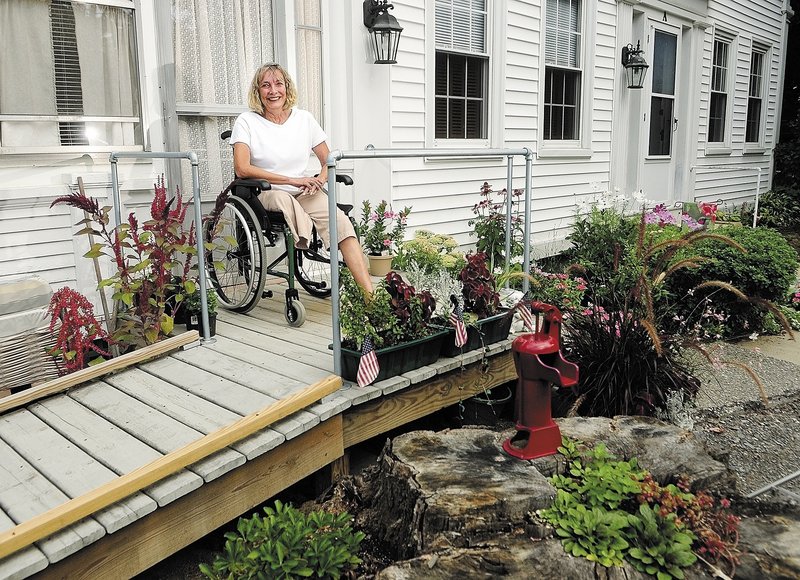WINTHROP – Ann Lindholm didn’t just pass through the valley of the shadow of death, she set up shop there. She emerged, she says now, a different person. And that change runs much deeper than the large section of one leg doctors had to cut off to save her life.
“You have to be stronger,” she said. “You can’t make it through without becoming stronger in all ways.”
Lindholm is taking that newfound strength, and her new lease on life, and pouring it into others. Beginning Sept. 11, Lindholm will host Amputee Support Peer Interaction Reclaiming Empowerment & Dignity, which goes by the acronym ASPIRED. The group, the first amputee support group in the area, will meet at 2 p.m. the second Wednesday of every month at the Town Office.
“I’m so excited,” Lindholm said. “I feel like a kid on Christmas Eve. It gives me a great deal of satisfaction. It gives me a purpose to live.”
Starting an amputee support group was the farthest thing from 63-year-old Linholm’s mind in 2010 when she and her husband, Lloyd Lindholm, sold Maple Tree Bed & Breakfast on High Street and entered into the snowbird life of wintering in Florida and summering in Maine. That was the plan until the couple’s first winter in Florida. A flare-up of Crohn’s disease forced Lindholm into the hospital in December 2010, and she stayed there for 11 of the next 12 months. Unable to eat because of the obstruction in her bowel the Crohn’s created, Lindholm’s weight fell below 70 pounds as her nutrient-starved body began consuming itself. She was routinely visited by hospice workers during that time and on at least one occasion, said her final farewell to her family.
“People could not believe I survived it,” she said. “They all thought I was going to die.”
PAIN PREVENTS REFLECTION
It was during that time that Lindholm developed an ulcer on her right foot. The sore turned gangrenous, requiring two surgeries that left Lindholm with an above-the-knee amputation. What would have been an agonizing decision for many people was, at first, little more than a blip for Lindholm. The pain that ravaged her body made philosophical reflection about life without a limb impossible.
“It was almost a year before I could even think about this as a reality,” she said. “I was just trying to survive one more day.”
The delay did nothing to mitigate the fear and anger Lindholm felt when she began to think about her new life as the rest of her body began to heal. Surgery and treatment had relieved the pain of the Crohn’s and allowed her to eat and regain her strength. No surgery or treatment could ever give her back her leg. Lindholm is unable to use a prosthetic leg because of the osteoporosis that set in during her sickness that has left her with brittle bones.
“I think the worst part for me was the realization that this was real,” she said. “It’s going to be this way forever. Your whole entire life, at that moment, became, ‘I can’t.’ It’s scary.”
Lindholm’s perspective began to change the day her son forced his mother to an empty parking lot to teach her how to drive with one leg. It took a couple weeks, but Lindholm soon had it mastered. She was driven to do more and more on her own. Lindholm now does almost everything she used to in day-to-day life, like cleaning the house and tending flower gardens that would be the envy of Martha Stewart. In the meantime, she is studying psychology and behavioral science at the University of Maine at Augusta where she is on the dean’s list.
“My son made the biggest difference in my life,” Lindholm said. “He said, ‘I’m tired of you saying you can’t. You’re going to.’ If you say you can’t, you won’t. There are certain mantras I live by, and that’s one of them.”
MAKING A DIFFERENCE FOR OTHERS
Lindholm is starting ASPIRED to help make the same difference for someone else. She began meeting with a peer trained by the Amputee Coalition of America shortly after her leg was removed. The two continue to speak regularly. The peer, who also has undergone an amputation, understands what Lindholm is going through in ways that doctors and even family members cannot.
When she returned to Maine, Lindholm went in search of a support group and was surprised to find none existed in the area. The only two groups in the state meet in Waterville and Portland. Any extra motivation Lindholm needed to start her own group came when she talked to a neighbor who also underwent an amputation because of illness. The two spent hours sharing their experiences. The neighbor recently died, only adding fuel to Lindholm’s fire. She attended an Amputee Coalition of America conference to become a certified peer.
“There wasn’t anybody there that didn’t smile every day and wasn’t happy and persistent,” Lindholm said.
Lindholm continues to struggle to regain her health. Doctors have told her that the Crohn’s will almost certainly reoccur and will likely be worse when it does. They also have told her she will likely lose her other leg at some point in the future because of continued complications.
In the meantime, she has created a Facebook support group that already has more than 90 members. Her hope is that monthly ASPIRED meetings will call people from surrounding communities to leave their homes, and their fear, and the feelings of “can’t.”
“The message is you are going to be fine. You’re going to get through it. All of this makes you stronger,” she said.
Craig Crosby can be contacted at 621-5642 or at
ccrosby@centralmaine.com
Send questions/comments to the editors.


